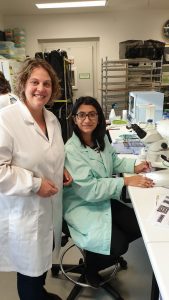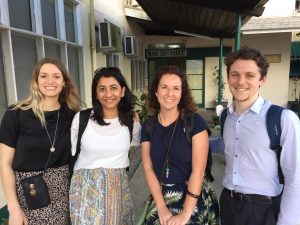17 September 2019
A Monash University student has spent five weeks conducting immersive research at the World Mosquito Program’s (WMP) Fiji site. Fiji experiences regular bouts of vector-borne disease and the program has operated there since 2018.
Tanaya Joshi is a Bachelor of Science Advanced – Global Challenges Student studying her Honours at Monash University (Faculty of Science) with WMP.
She tested a low-cost mosquito capture device she produced at Monash against a commercially produced aspirator in the Western division of Viti Levu, the largest island. This involved capturing Ae. aegypti in over 300 houses and surveying field staff about the device’s usability.
 WMP is an international not-for-profit organisation that works to reduce the effects of vector-borne disease across the world.
WMP is an international not-for-profit organisation that works to reduce the effects of vector-borne disease across the world.
It uses a natural and self-sustaining bacterium called Wolbachia, which prevents transmission of disease. Wolbachia is naturally occurring in 60 per cent of all insect species but is not found inside the primary species responsible for transmitting dengue, zika and chikungunya viruses.
“Researchers at WMP have successfully transferred Wolbachia from other insects into this primary Aedes aegypti species,” Tanaya says. “When Ae. aegypti carry Wolbachia, they have reduced ability to transmit viruses.”
WMP rears and releases these Wolbachia-carrying mosquitoes to reduce the threat of mosquito-borne diseases in 12 countries across the Americas, Pacific Island nations and Asia.
The model works because Wolbachia-carrying mosquitoes transmit the bacteria to their offspring and have reproductively favourable outcomes when mating with wild-type mosquitoes. Over time, the proportion of Wolbachia-carrying mosquitoes increases, and disease transmission is reduced.
Tanaya’s research is relevant to those last stages of mosquito release, focused on monitoring the effectiveness of the intervention.
“Effectiveness is monitored through capturing mosquitoes in areas where Wolbachia-carrying mosquitoes have been released and analysing the proportion of mosquitoes with Wolbachia,” she explains. “This, in addition to public health-based impact assessment, is critical to determining the success of the program.”
WMP employs two techniques to capture mosquitoes – a standing trap and a mosquito aspirator. Tanaya has researched and developed a low-cost aspirator with the aim of capturing mosquitoes at a reduced cost in the field.
 “The cost of monitoring and managing the operational logistics are considerable challenges for WMP, particularly as rapid expansion is on the horizon,” she says.
“The cost of monitoring and managing the operational logistics are considerable challenges for WMP, particularly as rapid expansion is on the horizon,” she says.
“As such, I have also been researching how monitoring could better be implemented by local organisations in each partner country. Transferring ownership of the intervention activities would allow for greater expansion, impact and protection of communities.”
The Fiji trip was part of this. Tanaya says working in the field has been an incredible experience. Local staff made the experience “thoroughly enjoyable and enlightening”. Her work will be formalised in a thesis due in mid-October. She will orally defend it during a presentation post-submission to conclude her Honours year.
“Speaking with local residents about the compassion and strength they embody when fighting diseases like these has been the highlight of my journey,” she says. “Their community minded approach to life is something I can definitely learn from.
“It is easy to feel isolation from the impact of your work when seated in Melbourne offices, so I am very grateful to have the opportunity to witness it first-hand. I also learned a lot about Fijian culture, and was able to draw similarities between my own Indian heritage.
“It’s been a greatly positive experience, both on the scientific and personal side.”
Tanaya Joshi
Email: tnjos1@student.monash.edu.
Twitter: @tanaya_joshi
Linked In: Click here.
Photo captions:
- Tanaya Joshi (right) learning how to identify adult mosquitoes by species and sex at the World Mosquito Program labs.
- At the Fiji Centre for Communicable Disease Control (FCCDC) with the World Mosquito Program. From left to right, Monash Honours students Josephine Kaldor and Tanaya Joshi, WMP Project Officer Carrie Forder and student Matt Cassar.



